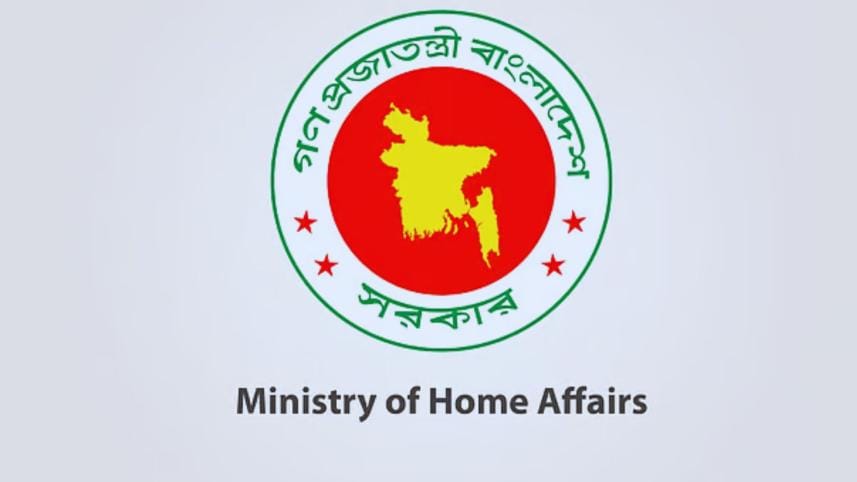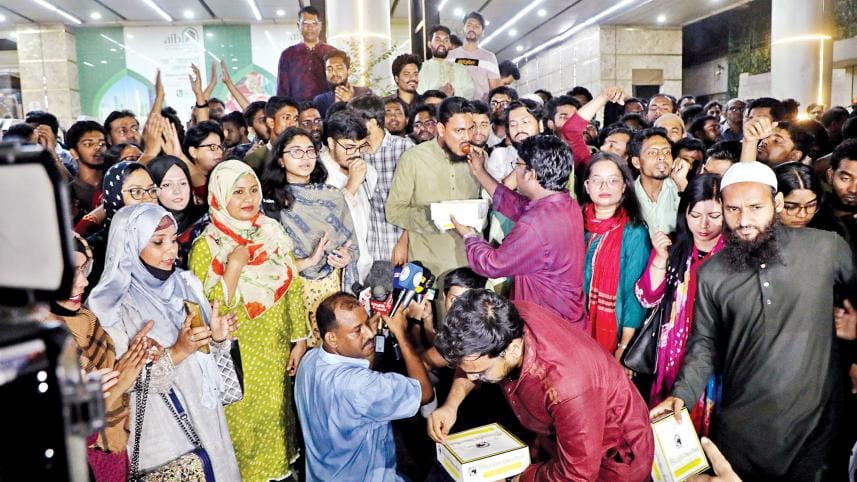Activities of AL, affiliates banned

The government yesterday banned all activities of the Awami League and its associated and affiliated organisations, on allegations of killings, genocide, crimes against humanity, and other grave offences during the July uprising.
Hours later, the Election Commission also suspended the party's registration.

The allegations against the party and its front organisations are specific and have been established by local and international reports, said a home ministry notification yesterday evening.
The ministry issued the notification with immediate effect, stating that the government invoked the Anti-Terrorism Act, 2009, and the Anti-Terrorism (Amendment) Ordinance, 2025, to enforce the ban.
All their activities, including any form of publication, publicity on mass media, online and social media, processions, meetings, rallies, and conferences will remain banned until the International Crimes Tribunal completes the trial of the leaders, the notification said.
The government said it has sufficient information and evidence that the Awami League and all its associated, affiliated, and like-minded organisations are engaged in various criminal activities and conspiracies to destabilise the state and make it ineffective.
These activities are similar to those of a terrorist organisation and are aimed at creating fear among the public, it added.
"The people of Bangladesh are breathing a sigh of relief following the ban on the Awami League's activities," Chief Adviser's Press Secretary Shafiqul Alam said while speaking at an event organised by Dhaka Reporters Unity in the capital yesterday morning.
The government, in a statement issued late last night, clarified that the ban will be applicable to the leaders, activists and members of the Awami League and its front organisations.


"However, the said notification does not diminish the freedom of expression of any other political party or people of free thought. The option to provide logical, constructive, or lawful analysis or opinion about the Awami League, its activities, or various steps taken by the government concerning the party has not been curtailed by the notification," it added.
NOTIFICATION
The party and its affiliated groups established a reign of terror across the country from January 6, 2009, when the Awami league government was formed, until its removal by the mass uprising of students and the public on August 5, 2024, the notification said.
Various oppressive and violent acts, including attacks, enforced disappearances, murders, torture, and rape were committed against opposition political parties and dissenting individuals in this period, it said.
There are clear allegations against the party and its associated groups of crimes such as enforced disappearances, murders, burning people alive, genocide, unlawful detentions, inhumane torture, looting, arson, and acts of terror, and crimes against humanity to suppress the student-public movement from July 15 to August 5, 2024, said the notification.
The notification also mentioned that a significant number of cases against leaders and activists of these organisations remain pending before the International Crimes Tribunal and the country's criminal courts.
Even after August 5, 2024, these organisations allegedly attacked participants of the uprising, organised provocative demonstrations, distributed anti-state leaflets, made incriminating statements through social media to obstruct their trials, instilled fear among the public, and threatened Bangladesh's unity, public security, and sovereignty, it said.

And it has been noticed that the fugitive leaders, including their chief, ousted prime minister Sheikh Hasina, have been making different incriminating statements from abroad while there are attempts to damage individual and state property, said the notification.
Hasina fled to India on August 5. Most of the party's top leaders are either hiding or are in jail.
According to the Awami League's charter, Bangladesh Mohila Awami League, Bangladesh Krishak League, Bangladesh Awami Jubo League, Awami Swechchhasebak League, Awami Ainjibi Parishad, Bangladesh Tanti League, and Bangladesh Jubo Mohila League are associate organisations of the party.
And the Jatiya Sramik League and Bangladesh Chhatra League are Awami League-backed organisations.
The interim government banned Chhatra League on October 23 last year, following demands from the Students Against Discrimination.
REGISTRATION
After the publication of the notification, the EC convened a meeting at about 5:45pm to decide the fate of the party's registration, said officials.
"As you are aware, earlier today the Ministry of Home Affairs banned the activities of the Bangladesh Awami League along with its affiliated and associate organisations. In light of that, the Election Commission has decided to suspend the Awami League's registration," Election Commission Secretary Akhtar Ahmed said around 9:30pm after the meeting.
The advisory council decided to slap the ban on the Awami League's activities in a special meeting chaired by Yunus on Saturday night following three days of demonstrations by the National Citizen Party (NCP) and several other political and student organisations.
Since the Anti-Terrorism Act, 2009, allows the banning of an entity, but does not contain any provision regarding the prohibition of its activities, the advisory council on Sunday approved the ordinance to amend the act.
AL HISTORY
The Awami League was established in 1949.
The party, along with others, was banned by the Pakistani military ruler Ayub Khan in 1958.
In 1971, the party, under the leadership of Bangabandhu Sheikh Mujibur Rahman, led the struggle for independence.
After the emergence of independent Bangladesh, the Awami League won the first general election.
On January 25, 1975, Sheikh Mujibur Rahman dissolved all political parties, including the Awami League, and introduced a one-party rule under Bangladesh Krishak Sramik Awami League or BAKSAL.
Following his assassination on August 15 that year, all political activities were suspended under martial law. Political activities resumed later, and some leaders revived the AL.
In 1981, Hasina, the daughter of Bangabandhu Sheikh Mujibur Rahman, became the president of the party and has continued to hold the position to this date.
The party assumed power in 1996.
After 2008, it was in power for four straight terms under Hasina.
During her tenure, voters could not cast their votes. The rule of law became a distant dream; the media faced constant restrictions; freedom of speech was curtailed; dissenting voices were gagged. Corruption and siphoning of billions of dollars in collusion with opportunist businessmen also took place.



 For all latest news, follow The Daily Star's Google News channel.
For all latest news, follow The Daily Star's Google News channel. 
Comments